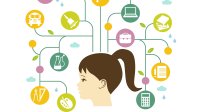The Teenage Brain Is Wired to Learn—So Make Sure Your Students Know It
Thanks to the wonders of neuroplasticity, adolescents are primed to improve their performance in school—and beyond. Here’s how to help.
Your content has been saved!
Go to My Saved Content.Adolescence is an exciting time as teenagers become increasingly independent, begin to look forward to their lives beyond high school, and undergo many physical, emotional, and cognitive changes. In that last category, teenagers can learn to take charge of their developing brains and steer their thinking in positive and productive directions toward future college and career success.
The brain’s prefrontal cortex, which functions as the control center for executive functions such as planning, goal setting, decision making, and problem solving, undergoes significant changes during the teenage years. In an NPR interview, Laurence Steinberg, author of Age of Opportunity: Lessons From the New Science of Adolescence, notes that ages 12 to 25 are a period of extraordinary neuroplasticity. “Science suggests that it’s important for kids to be challenged and exposed to novelty in order to facilitate healthy development of brain systems that are important for things like self-regulation,” Steinberg says.
The potential that comes from neuroplasticity—the capacity to change the structure and function of the brain through learning—provides the foundation for two crucial messages for middle and high school students:
- They have the capacity to become functionally smarter. By their early teens, many youths have already formed an image of themselves as intellectually capable—or not. It’s important to emphasize for students in the latter group that past school performance need not be a predictor of future outcomes, if they are willing to persist in the hard work that may be required when learning gets challenging.
- Success in school is largely determined by the learning strategies students employ, and not by some innate talent for academics. Students across the continuum of current performance can learn and improve effective problem-solving and study skills to nudge their grades in a positive direction.
Tools for Self-Directed Learning
As they progress through middle and high school, students are expected to take on increasing responsibility for their learning, with more out-of-class assignments that require independent research, reading for understanding, and wider application of classroom lessons. Our new book, Teaching Students to Drive Their Brains: Metacognitive Strategies, Activities, and Lesson Ideas, suggests that learning and applying strategies to “explain it to your brain” can help students improve their study habits. We note some of those strategies here.
Don’t just read—learn. There can be a huge difference between reading the words on the page and learning from them. To think through the ideas in a reading assignment and improve recall of what they have read, students might benefit from:
- Creating diagrams, pictures, and symbols to represent key ideas as they take notes;
- Summarizing passages in their own words (some students might enjoy the challenge of capturing the essence of an assignment in a tweet); and
- Searching for cues about the most important content. For textbook assignments, students can go back and review features like key terms, subtitles, and informational graphics after their first reading to reinforce crucial facts. When reading fiction or poetry, identifying literary devices such as metaphors and symbols can help uncover deeper meaning.
Consider the source. Like the reading strategies included here, a careful consideration of the credibility of sources, especially online ones, that students consult and cite in their research projects is a learning strategy that will serve them well throughout their lives. Is the information presented fact or opinion? Is the objective of this resource to inform, to influence, or to entertain? Are the authors and/or the sources cited reputable and qualified to discuss this topic? Making these kinds of judgments is a crucial executive function for students to develop. In his book The Adolescent Brain: Reaching for Autonomy, Robert Sylwester identifies this careful approach to vetting information sources as one of the “intuitive, logical, and predictive capabilities that will enhance the resolution of . . . emerging vocational challenges.”
Create, then edit. Two common problems in academic writing are getting stalled out early on in writing the introduction and failing to edit the first draft carefully. Guide students to begin productively by putting in writing the information they want to convey without worrying about how they will word the first paragraph. That task will be much easier once they have laid out all the content they have gathered. And remind them to allow time to edit their papers not once, but twice, before turning them in.
Make a schedule—and stick to it. Planning and organizing are versatile executive functions that students will use in every subject and in their personal lives as well. For independent study projects, guide your students to develop a step-by-step process, to set dates to complete each step, and to build in extra time for unexpected issues, such as the need to conduct another round of research.
Read ahead to stay ahead. Encourage students to finish every reading assignment by reading a few pages ahead. This strategy can help improve understanding and recall by showing students how the information presented in one chapter is applied and expanded on in the next.
Become metacognitive about which study skills work best for you. Students will likely find that some of these strategies are more effective for them than others. Encourage them to try different strategies and to assess which ones get the best results for them. Some students may learn better in study groups, some by creating elaborate graphics to explore and connect the concepts they are studying, and some by reading and explaining the content aloud to themselves, to give just a few examples.
